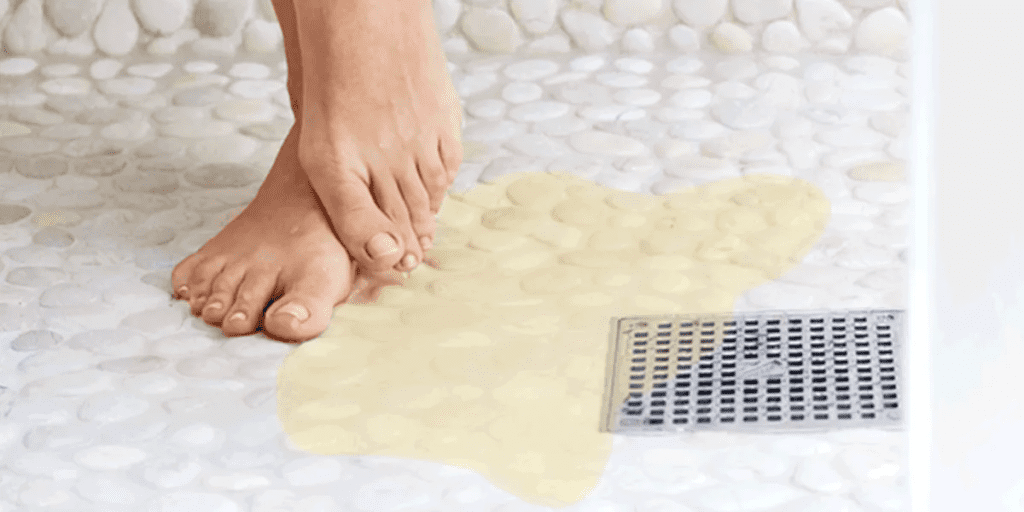Most of us have probably done it at some point. You’re already in the shower, the warm water is running, and nature calls. It seems harmless, right? Peeing in the shower can even seem practical—it saves water, and you can wash off immediately. But, as harmless as it may feel, a pelvic floor expert is now explaining why it might be time to break this habit. According to Dr. Alicia Jeffrey-Thomas, a pelvic floor therapist, peeing in the shower could be affecting your bladder health in ways you may not expect. Let’s dive into why you might want to think twice before answering nature’s call in the shower.
The Link Between Peeing in the Shower and Pavlov’s Dogs

Dr. Jeffrey-Thomas made waves on TikTok when she drew a surprising connection between peeing in the shower and Pavlov’s classical conditioning experiment. In the early 1900s, psychologist Ivan Pavlov famously trained dogs to salivate at the sound of a bell by associating the sound with food. According to Dr. Jeffrey-Thomas, a similar process can occur when you pee in the shower—you’re essentially conditioning your brain and bladder to associate running water with the need to urinate.
This might not seem like a big deal at first. But over time, you could find yourself needing to pee whenever you hear water, whether you’re in the shower or just listening to the rain outside. For some people, especially those with pelvic floor issues, this can lead to unintended leaks at the sound of running water. Dr. Jeffrey-Thomas warns that this habit could result in a condition where your bladder reacts to water sounds, sparking an uncontrollable urge to pee.
How Shower Peeing Could Impact Your Pelvic Floor Health
If you struggle with pelvic floor dysfunction or incontinence, peeing in the shower could be making things worse. Your pelvic floor muscles support the bladder, uterus, and other organs. When these muscles weaken, it can lead to bladder leaks or sudden, urgent bathroom trips.
By repeatedly peeing in the shower, you could be weakening these muscles even further. Over time, this habit could train your bladder to be triggered by running water, which may lead to involuntary bladder contractions. Dr. Jeffrey-Thomas explains that, for those with a weakened pelvic floor, this conditioning could exacerbate symptoms and lead to more frequent leaks.
The Science of Conditioned Responses
It all comes back to conditioning—a psychological process where behaviors become associated with specific stimuli. By allowing yourself to pee in the shower while listening to the sound of running water, you’re reinforcing a connection in your brain. Eventually, your bladder might respond every time it hears water, like a faucet running or a rainstorm. This reaction is not necessarily permanent, but breaking the habit can be challenging once your brain has established that connection.
The Potential Side Effects of Water Conditioning
Beyond pelvic floor issues, associating the sound of running water with the need to urinate can disrupt your daily life. Imagine constantly feeling the urge to pee while doing simple activities like washing dishes or walking in the rain. While it may sound minor, this conditioned response can become irritating or even anxiety-inducing over time.
Comments and Reactions: Is This Really a Common Problem?
When Dr. Jeffrey-Thomas shared her advice on TikTok, the response was overwhelming. Many people were shocked, while others started to reflect on their own experiences. One user commented, “I grew up peeing in the ocean, and now I feel like I need to pee every time I swim.” Another admitted, “Is that why I never have to pee until I get in the bath or shower?” It’s clear that for some, this isn’t just a quirky coincidence but a genuine association their bodies have made.

Other comments showed some healthy skepticism. Some users wondered if the number of times they go to the bathroom without running water would counteract this conditioning. While it’s possible to “untrain” these associations, it can be challenging for those who have already established this connection.
Practical Tips for Breaking the Shower Pee Habit
If you’re ready to stop peeing in the shower, you’re not alone—and the good news is, there are steps you can take to break this habit.
1. Use Mindful Bathroom Breaks
The first step is to make sure you’re emptying your bladder before stepping into the shower. Take a moment before you turn on the water to visit the bathroom. This not only helps you break the association between running water and urination but also reinforces healthy bathroom habits.
2. Recondition Your Bladder
If you find that you frequently need to pee when you hear running water, try some reconditioning techniques. One method is to gradually increase the time between hearing water and responding with urination. For instance, if you need to go when you hear the sink running, wait a few moments before giving in. This can help retrain your brain and bladder to break the connection.
3. Strengthen Your Pelvic Floor Muscles

Pelvic floor exercises, like Kegels, can be incredibly effective at strengthening the muscles that support your bladder. Regularly practicing these exercises can help you regain control and reduce the risk of bladder leaks, especially if you struggle with pelvic floor dysfunction. Strong pelvic muscles are less likely to respond involuntarily to the sound of running water.
Why You Might Want to Skip Peeing in the Shower for Hygiene Reasons
Aside from bladder health, there are also hygiene considerations. The bathroom floor and shower drains aren’t designed to handle urine the way a toilet is. Urine can build up bacteria, which, when combined with warm water, creates a breeding ground for germs. So while it might seem efficient to “kill two birds with one stone,” it’s not necessarily the most hygienic option.
What Experts Say: Addressing the Urge
@thepelvicdancefloor Reply to @gwas007 why you shouldn’t pee in the shower (probably part 1 of multiple?) #learnontiktok #tiktokpartner ♬ Similar Sensation (Instrumental) – BLVKSHP
Some urologists suggest that if you find yourself needing to pee when you hear water, you might be dealing with overactive bladder syndrome. If you’re struggling with frequent or urgent bathroom trips, consider consulting a healthcare professional. They can provide additional strategies and even explore whether physical therapy for the pelvic floor could benefit you.
Conclusion: Time to Break the Habit?
While peeing in the shower may seem like a harmless shortcut, Dr. Alicia Jeffrey-Thomas’s advice reminds us that it can have unintended consequences for our bladder and pelvic health. By associating running water with the need to urinate, you might be conditioning your body in ways that lead to unexpected bladder responses. If you’ve noticed an urge to pee whenever you’re around water, or if you’re experiencing leaks, it might be worth reconsidering this habit.
With some simple changes, like visiting the bathroom before stepping into the shower and strengthening your pelvic floor, you can break the connection and avoid potential issues down the line. So, the next time you’re tempted to pee in the shower, remember: your future bladder health may thank you for skipping it.


